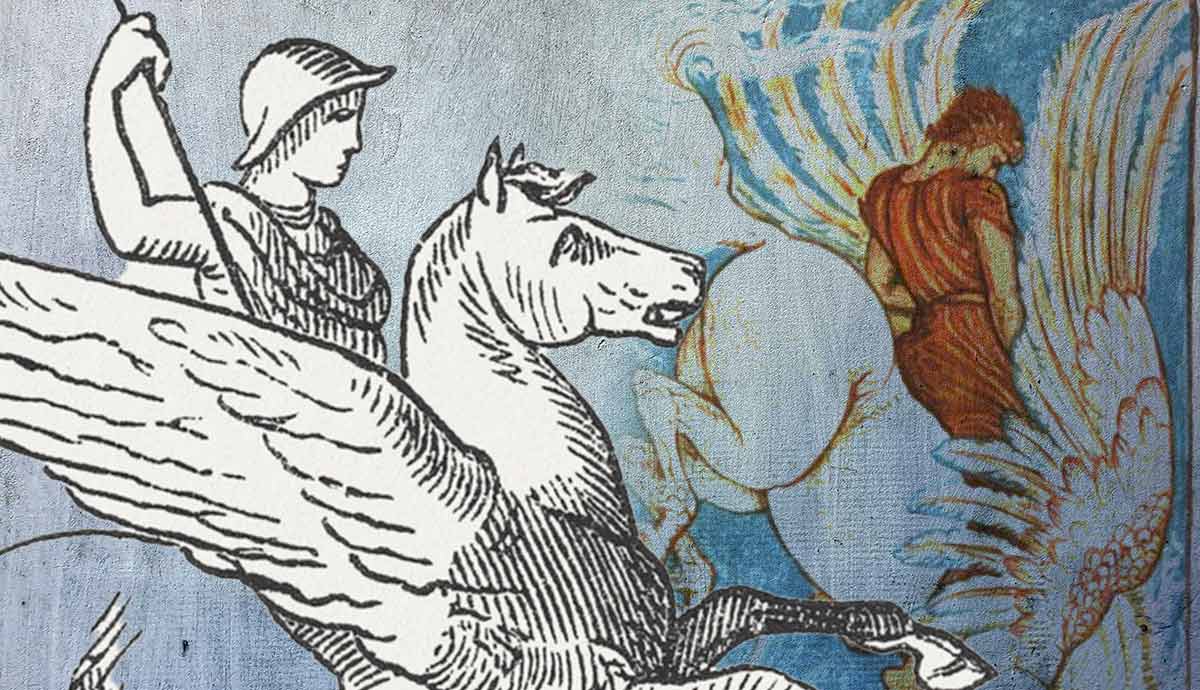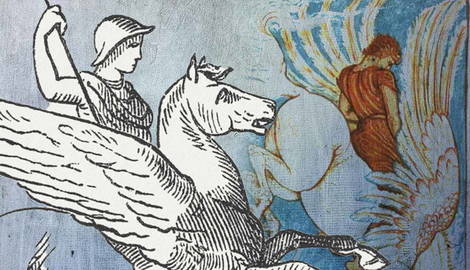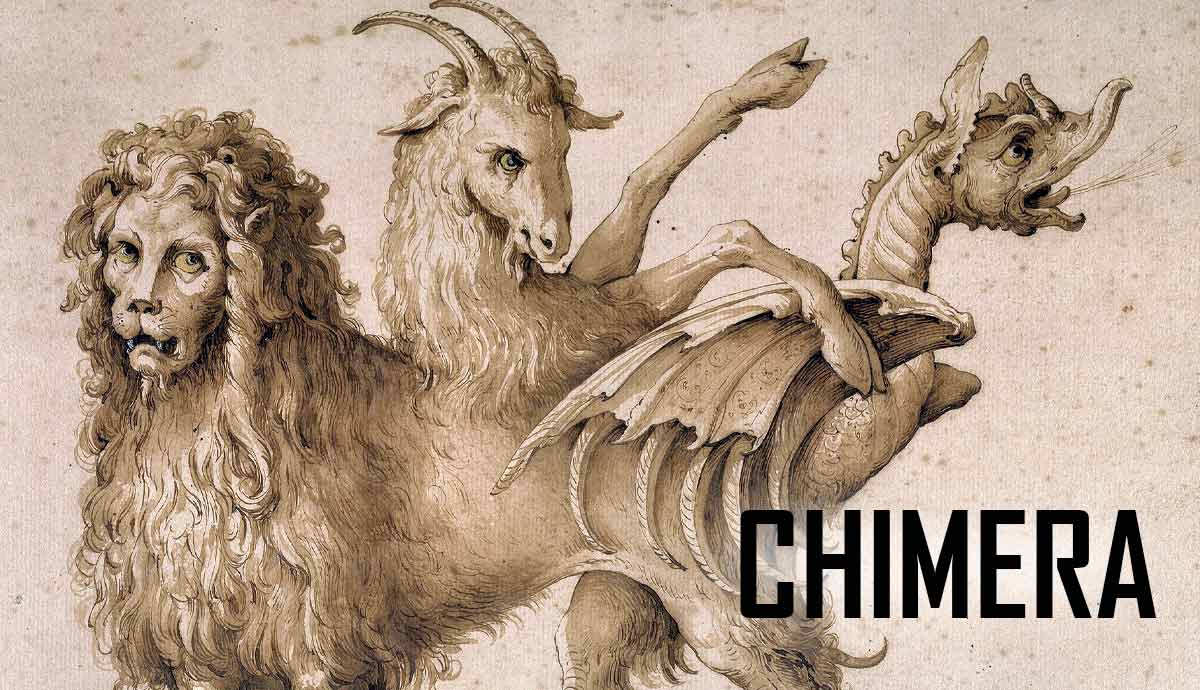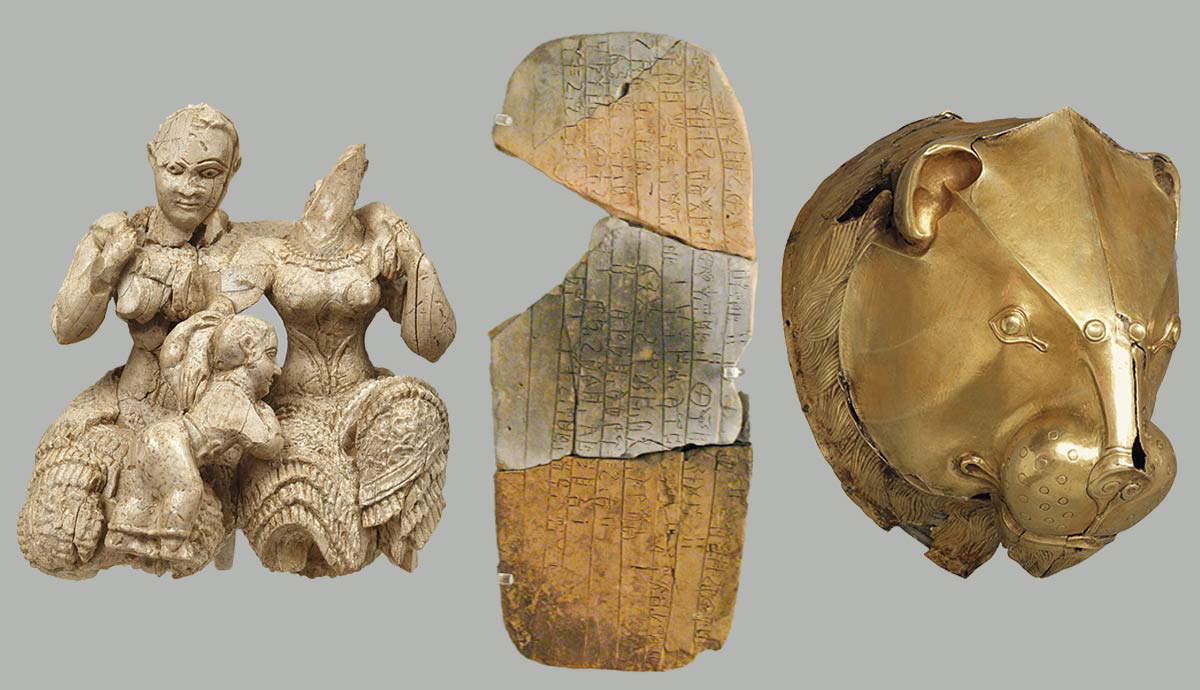
The heroic tale of Bellerophon and Pegasus is an inspiring story of perseverance and triumph in the face of insurmountable challenges. Despite facing misfortune initially, Bellerophon refused to let fate dictate his destiny. He accomplished the seemingly impossible by defeating fire-breathing beasts and fierce armies, all while soaring above legendary heroes on the back of his faithful companion, the mythical flying horse Pegasus.
Early Life of Bellerophon

Bellerophon, or Bellerophontes, was King Glaucus’s son and Sisyphus’s grandson. Cunning Sisyphus famously tricked the gods of Olympus and captured and defied death for a fleeting moment before his eternal punishment in the depths of Tartarus. However, like many legendary Greek heroes, Bellerophon’s parentage is disputed, with many accounts claiming that his true father was the sea god Poseidon. Although Bellerophon’s paternal lineage is slightly murky, all accounts agree that his mother was Eurynome, favored by the goddess Athena, who taught Eurynome wisdom and all her patron crafts and skills.
According to Hesiod, as a further punishment for Sisyphus, Zeus ordered his family to beget no more children by making Glaucus infertile. The account seems to be an attempt by Hesiod to clear up Bellerophon’s true ancestry. However, regardless of who Bellerophon’s father was, Glaucus and Eurynome loved and doted on the young prince throughout his childhood.
Bellerophon’s early life mimics many other heroic Greek figures; he was considered handsome, charming, and athletic by all. One can imagine that growing up, young Bellerophon may have heard rumors of his divine ancestry. He may have even doubted these claims as he never showed affinity for, or attraction to, the sea, his apparent father’s domain. Yet, Bellerophon shows an innate talent with horses, Poseidon’s sacred animal.
According to legend, Poseidon was smitten with the goddess Demeter but she refused his advances. She challenged him to create the most beautiful animal to win her heart. He created several animals, including the hippopotamus, giraffe, donkey, and zebra, but Demeter found each one unsatisfactory. Finally, Poseidon created the horse, which she deemed perfect. As a result, Poseidon became the god of horses, and his obsession with Demeter vanished while creating this ideal animal.

It appears that Bellerophon was not born with his current name. He was initially named Hipponous because of his affinity for horses. The reason for his name change is also the event that triggered his heroic journey, full of bravery and misfortune.
As in all ancient myths, accounts vary, but the main actions remain the same. On one tragic day, a young Hipponous accidentally killed a fellow Corinthian noble named Belleros while practicing knife throwing with friends. The accidental crime marked the end of Hipponous and the birth of Bellerophon, the killer of Belleros. In other versions of the myth, Bellerophon accidentally murders his brother Deilades (sometimes called Peiren or Alcimenes) instead of or after Belleros.
In ancient Greek society, killing a family member was considered a most severe crime, regardless of whether it was intentional or not. The goddesses of vengeance, the Erinyes or Furies, would relentlessly pursue and torment anyone who broke Zeus’ most sacred laws. Only through ritual cleansing and purification could perpetrators of such blood crimes hope to escape the wrath of these chthonic goddesses. Bellerophon, for instance, needed to undergo a ritual cleansing from an oracle or an anointed king to be absolved of his crime.

The Erinyes did not hunt all murderers, only those that killed their blood relatives. It is plausible that later writers added his accidental killing of a blood relative to make his need for ritual purification more plausible. After this unfortunate accident, Bellerophon was exiled from Corinth and sent by his parents to be cleansed by Proetus, the King of Tiryns in Achaea. It is here that Bellerophon’s journey truly begins.
Purification and Rejection

King Proetus welcomed Bellerophon as an honored guest and cleansed him of his blood crime. However, Bellerophon’s good looks and charm caught the attention of Queen Stheneboea, also known as Anteia, in some variations. In some versions, she falls in love with Bellerophon, while in others, she desires his handsome appearance. Regardless, all accounts end with her attempting to seduce the young prince and invite him for a night of pleasure.
It is impossible to know how Bellerophon felt when the queen propositioned him. Despite being a young and inexperienced prince, he was torn between his desire to join the beautiful queen and his sense of respect and honor. Ultimately, Bellerophon rejected the queen’s offer outright as he could not disrespect the kind king who had helped him atone for his blood crime. Unfortunately, things didn’t go well for Bellerophon.
Stheneboea, either heartbroken, angered, or ashamed by the rejection, decides to get revenge on Bellerophon. The following day, she approaches her husband, King Proetus, and spins a fantastical tale that reverses the actors’ roles of the previous night’s events. Stheneboea takes things a step further by implying that Bellerophon attempted to force himself on her but she managed to get rid of him before anything more could happen.
Understandably, Proetus does not doubt his beloved wife’s story for a second. It takes every ounce of self-control he has not to plunge a dagger in his heart for such a disrespectful act and slight against his gracious hospitality. However, the rules of hospitality keep him seated and conflicted about what he should do.

The sacred law of hospitality, also known as Xenia, prohibited anyone from harming their guest. This rule was one of the holy laws of Zeus, second only to killing a family member. Going against this law would result in the wrath of the Erinyes. Therefore, Proetus could not harm Bellerophon, who was his guest. However, the wise king quickly devised a plan to take his revenge without breaking the sacred law of Xenia.
Later that day, Proetus called for Bellerophon to come to his chambers. Bellerophon may have intended to share his account of the previous night’s events with the king, or he may have hoped to keep the experience to himself. It is also possible that he believed the summons was related to what had happened the night before.
Feigning kindness and good grace, Proetus tells Bellerophon that he is now wholly absolved of his blood crime. He then asks Bellerophon to perform an urgent mission for him. Proetus wants Bellerophon to deliver a private message, a clay tablet, to Stheneboea’s father and his father-in-law, Iobates, the king of Lycia, near the river Xanthus.
It is worth noting that no known written alphabet existed in ancient Greece during Bellerophon’s time. Therefore, the message was a foldable clay tablet with symbols that the recipient could still understand, as described by Homer. The contents of the letter appear relatively constant throughout the different variations of the myth: “The bearer of this letter attempted to violate my wife, your daughter. Please kill him.”
Bellerophon happily agreed to complete the task, considering Proetus’ kindness, and began his journey to the Palace of King Iobates, a journey Proetus hoped he would never return from.
The Palace of Iobates and the First Impossible Task

Iobates welcomed Bellerophon into his home without paying much attention to the critical message the young prince brought with him. Instead, Iobates hosted a grand party for Bellerophon, consisting of nine days and nights of feasting, drinking, and hunting. Only on the tenth day did Iobates finally decide to read the clay tablet sent by Proetus.
Upon reading the message, Iobates must have reacted similarly to Proetus. The previous days and nights of celebration now looked like a tragic comedy of errors as Iobates found himself in the same predicament as Proetus. Iobates could not fulfill Proteus’ request and kill Bellerophon after showing him hospitality, as he would also defy the sacred law of Xenia.
However, Iobates devised a cunning plan similar to Proetus’. He found a sneaky loophole that allowed him to take revenge on his guest, Bellerophon, without defying the sacred laws of hospitality.
Iobates had a straightforward plan. He asked the young and noble Bellerophon for help with a monster causing havoc in his kingdom in the region of Caria. The beast was killing citizens, eating livestock, and destroying crops. Iobates requested Bellerophon find and kill the mythical three-headed fire-breathing beast, the Chimera.
Ever the hero, Bellerophon eagerly accepted Iobate’s request to slay the Chimaera and carve his name in history and legend. During his journey to Caria to defeat the Chimera, Bellerophon meets the renowned Corinthian prophet Polyeidos. The prophet advises Bellerophon that he cannot defeat the Chimera alone. He must first befriend and tame the legendary winged horse Pegasus to succeed.
Who Was Pegasus?

Pegasus is usually depicted as a snow-white winged stallion. He is the product of the strange union between the sea god Poseidon and the fabled Gorgon Medusa. Interestingly, Pegasus and his brother Chrysaor, who, by all accounts, was not a horse but a divine human, sprang into existence when the legendary hero Perseus decapitated Medusa in his own story.
In some accounts, the two brothers shot out of the headless Gorgon, implying that Medusa had been pregnant with them through Poseidon for some time. Others claim they were born similar to Aphrodite when Medusa’s blood landed on the earth or sea, mingled with Poseidon, and created the two brothers.
There is very little information available about Chryasor, Pegasus’ brother. His name means “he who has a golden sword,” and according to Hesiod, he was married to the Oceanid Callirhoe. Some scholars believe that Chryasor is a double of Bellerophon because Pegasus and Bellerophon are technically brothers. They share the same divine father, Poseidon.

After Pegasus was born, he flew to Mount Helicon, the home of the nine Muses. He then struck his hoof into the earth, creating the Hippocrene, a famous spring that was a source of inspiration for artists throughout ancient Greece. Many myths suggest that Pegasus lived near this spring and flew to Corinth, where he created another legendary spring known as the Fountain Peirene. It is at this fountain that Pegasus and Bellerophon were destined to meet each other.
The Taming of Pegasus

In the early versions of the Bellerophon myth, such as in works by Homer and Hesiod, the taming of Pegasus is not mentioned. Later, writers like Pindar expanded on the story, and it became a standard part of the narrative.
According to Polyeidos, the only way to tame Pegasus is to seek guidance from the goddess Athena in her sacred temple in Corinth. Bellerophon is instructed to spend a night in the temple, where he has a divine dream. In the dream, Athena gives him a golden bridle and tells him to use it and his natural talent for horses to tame his half-brother, Pegasus.
The following day, Bellerophon wakes up with the golden bridle in his hand. Before heading to the never-ending fountain of Peirene, he sacrifices a white bull to his father, Poseidon, as Athena had instructed. Bellerophon patiently waits for several hours for Pegasus to arrive at the fountain of Peirene.

Once the majestic creature arrives, Bellerophon slowly approaches him, speaking soothingly. He tries to put on Athena’s golden bridle, but initially, Pegasus refuses his attempts. However, he eventually relents after sensing Bellerophon’s innate horsemanship and their destined companionship, which their father, Poseidon, foretold. In other versions of the myth, Athena brings an already bridled Pegasus directly to Bellerophon after his night in her temple. Regardless of how it happened, all versions end with Bellerophon and Pegasus flying to Caria to defeat the Chimera.
The Slaying of the Chimera

The Chimera is a hybrid of three animals: a lion, a goat, and a snake. It is believed to be the offspring of two mythical serpentine creatures, Typhon and Echidna. They were the parents of other notable monsters in Greek mythology, such as the Hydra and Cerberus. The Chimera has a unique appearance: a lion’s head and front legs, a she-goat’s torso and hind legs, and a snake’s tail. The goat’s torso has a fire-breathing head protruding from it, and the serpent’s tail has a snake’s head at its end.

When Bellerophon and Pegasus finally reach Caria and find the Chimera, Bellerophon initially fires down a storm of arrows from above. Unfortunately, none of Bellerophon’s arrows managed to pierce the thick hide of the monstrous beast, who retaliates with hellish plumes of fire that nearly burn Pegasus and Bellerophon to cinders. In some versions, Bellerophon attempts to attack her with a spear, trident, and sword to no avail. These setbacks do not dissuade Bellerophon, who, after much trial and error, devises an ingenious method to slay the monster.
Bellerophon prepares for his final attack against the Chimera. He attaches a sturdy chunk of lead to the tip of his spear and mounts Pegasus. The heroic duo flies in close, with Bellerophon holding his lead-tipped spear at the ready. Timing is everything here, and just as the Chimera launches its flaming breath, Bellerophon hurls his spear into the beast’s open mouth, hitting her in the back of the throat. The spear barely pierces the beast, but that was not Bellerophon’s intent. He timed his attack to coincide with the Chimera’s deadly breath, which melts the chunk of lead he attached to his spear. As Pegasus barely evades the flames, Bellerophon watches with pride as the Chimera begins to choke on the now-molten lead that burns and suffocates her from the inside.

After completing a task that Iobates believed impossible, Bellerophon defeated the beast, considered deadly even for the strongest heroes. He cut off the three heads of the Chimera and flew back to the king’s palace with his new friend, Pegasus, to show Iobates the results of his long and dangerous journey.
More Impossible Tasks

Bellerophon’s triumphant return must have been bittersweet for King Iobates. His plan had utterly failed. Bellerophon had defeated a monster that had devastated his kingdom for some time; his citizens were finally safe. However, Bellerophon was still alive and, even worse, was now celebrated as a hero by his people. The slight hiccup did not dissuade Iobates, though. He openly doubts Bellerophon’s story and soon conceives of another impossible task for Bellerophon.
Iobates, the king of Lycia, complains to Bellerophon about the ongoing troubles his kingdom is facing. The Solymi, a warlike tribe, had violently attacked and raided the kingdom’s borders. Iobates requests Bellerophon to bring peace to the kingdom by eliminating the barbaric tribe or negotiating peace with them. Bellerophon, always the hero, gladly accepts the difficult mission and flies away on Pegasus to face the challenge.
There is no detailed account of what happened between Bellerophon and the Solymi. However, after a few days, Bellerophon returned to Iobates to inform him that the conflict with the Solymi had been resolved. Peace had been restored along the Lycian border. Despite this success, Iobates asked Bellerophon to undertake another impossible task.

Next, Iobates requested Bellerophon handle the notorious Amazons, a tribe of warrior women who had ravaged his kingdom, similar to the Solymi. Knowing the Amazons’ reputation, Iobates was confident that Bellerophon and his winged horse, Pegasus, would meet a tragic fate. However, Bellerophon had a different plan in mind. He realized he could not win against the Amazons in a traditional ground-based battle, so he opted for aerial warfare. Bellerophon and Pegasus attacked the Amazons from above by hurling boulders on top of them, crushing the legendary warriors. With this successful assault, Bellerophon and Pegasus emerged victorious and returned to Iobates.
Iobates, feeling frustrated, once again challenged Bellerophon to undertake another impossible task. This time, he was to defeat a Carian pirate named Cheirmarrhus. The pirate attempted to assassinate Bellerophon but was easily defeated by the hero. Interestingly, Bellerophon’s encounter with Cheirmarrhus, the pirate, is similar to his battle with the Chimera. The pirate’s ship was said to have a lion’s figurehead on the prow and a snake for a sternpost, which, along with the fact that both the words Chimera and Cheirmarrhus come from the Greek word for goat, has led scholars to speculate that the pirate tale may have been another version of Bellerophon’s battle with the Chimera.
The Final Straw

The news of Bellerophon’s victory over the pirates reached Iobates before the hero’s return. However, instead of welcoming him back, the king had finally reached his limit with the farce he had found himself in. Iobates ordered his guards to take up arms against Bellerophon. When the hero arrived, he saw armed guards outside the now-closed city gates, and everything finally clicked into place. Bellerophon realized the actual reason why Iobates had sent him on so many dangerous missions — to kill him.
When the armed guards attacked him, Bellerophon prayed to his divine father, Poseidon, for help in defeating them and to take revenge against the city for their deception. Poseidon granted his son’s request, and the River Xanthus rose as a tidal wave behind Bellerophon as he marched towards the city, causing the palace guards to stop in their tracks. Iobates, the king, sent messengers to Bellerophon requesting peace, but Bellerophon rejected them all, determined to use the mighty river to flatten the city.
In a last effort, the city women ran towards him and pulled up their dresses, flashing him while begging him to stop. Despite being a monster slayer and the tamer of Pegasus, Bellerophon was still an inexperienced youth and blushed in embarrassment at the sight of the women flashing him. He immediately retreated and returned the river to normal.

After regaining his composure, Bellerophon mounted Pegasus and flew to the king’s court to confront Iobates. Iobates pleaded forgiveness as he had had a change of heart about Bellerophon after witnessing the gods coming to his aid. Iobates believed that if Bellerophon had indeed attempted to violate his daughter and was genuinely wicked, then the gods would have left him for dead and not come to his rescue.
The king showed Bellerophon the clay tablet Proetus sent, and the colossal misunderstanding was resolved. As an apology and a reward for accomplishing many impossible tasks on behalf of the kingdom, Iobates offered Bellerophon his remaining daughter Philonoes’ hand in marriage and half of his kingdom.
A Tragic End to a Proud Hero

Bellerophon spent the rest of his life ruling the kingdom of Lycia alongside his beloved wife, Philonoe. Together, they had three children: Isander, Hippolochus, and Laodamia. Hippolochus’s son, Glaucus, fought in the Trojan War and recounted his grandfather’s epic adventure in the Iliad. Laodamia, on the other hand, became the mother of Sarpedon, another notable hero who fought in the Trojan War.
Unfortunately, Bellerophon’s story did not have a happy ending. Toward the end of his life, the arrogant king, who had accomplished many impossible tasks, believed that the gods of Olympus owed him a reward. Bellerophon wanted to become a god and live forever. He and his loyal companion Pegasus flew up to Olympus, but Zeus, the king of the gods, was angry with Bellerophon’s presumption. Therefore, he sent a gadfly to bite Pegasus, making him buck and throw Bellerophon off his back.

In the story of Bellerophon, his arrogance led him to fly too close to the sun, similar to how Icarus met his fate. In some versions of the story, Bellerophon dies in the fall, while in others, he survives but becomes severely disabled. As a result of his egotistical flight, he is shunned by humanity for the rest of his life. On the other hand, Pegasus makes his way to Olympus and becomes Zeus’ faithful pack animal, carrying the god’s thunderbolts for eternity.
It is rare to hear stories of Greek heroes who die peacefully in their sleep and live happily ever after. However, it is even more heart-wrenching to learn about those heroes who die alone and rejected by society, such as Bellerophon. The story of Bellerophon has been used as a warning to remind people never to let their ego get the best of them and not to aim higher than they can handle.










